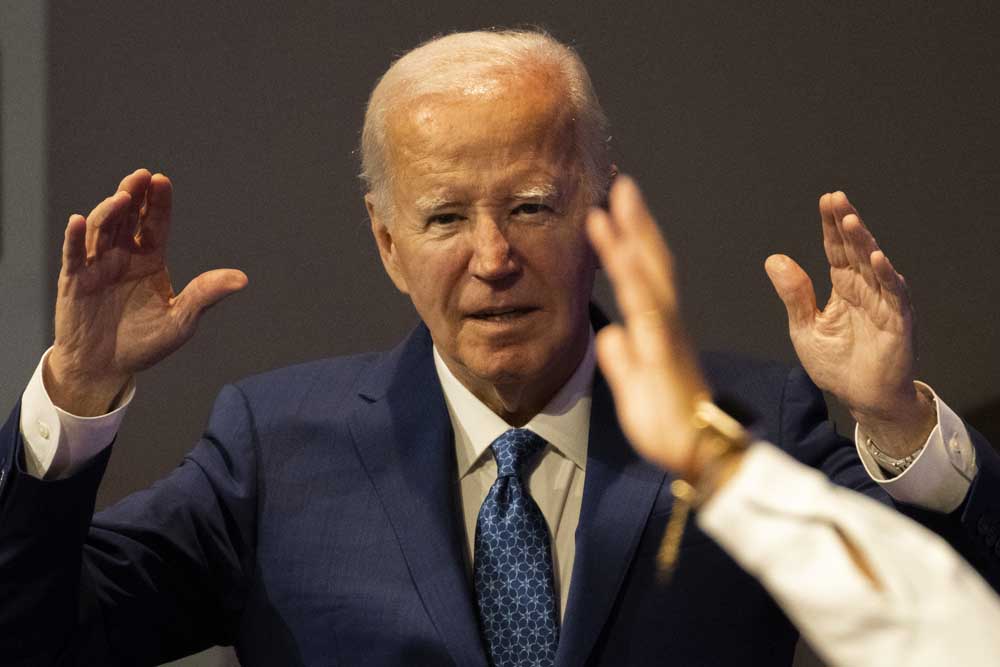Not for web
Published 9:00 pm Tuesday, July 9, 2024

- President Joe Biden attends a church service at Mount Airy Church of God in Christ, Sunday, July 7, 2024, in Philadelphia, Pennsylvania.
Top officials of 31 North Atlantic Treaty Organization member states are gathering in Washington this week for a special summit in honor of the alliance’s 75th anniversary. They do so, alas, as the 32nd — and most important — NATO country, the United States, is embroiled in a political crisis. After a spectacularly bad performance at the June 27 presidential debate sowed doubts about his fitness for office, President Biden faces intense pressure to end his campaign for a second term.
As it happens, NATO figures prominently in Biden’s increasingly adamant argument that he should stay the course — against an opponent, former president Donald Trump, who has voiced skepticism about the alliance’s value. Biden boasts, justifiably, of the Western alliance’s revitalization and expansion on his watch, and of how he has marshaled the West in support of Ukraine after Russia’s full-scale invasion in 2022. NATO members have taken more responsibility for their own defense, with a record number finally hitting their defense spending targets. All of this raises the price Russia must pay for its revanchism — and deters President Vladimir Putin from pushing deeper into Europe.
Something else might be true, too, however — even if Biden seems unable to grasp it: The 81-year-old president’s determination to seek a second term, in spite of signs he might not be up to the job, could jeopardize these foreign policy successes by increasing the odds that Trump wins. Biden appears to be in denial about polls that show most voters doubt his ability to perform the world’s most demanding job.
A timely reminder of the stakes in the U.S. election came Monday as Russia destroyed Ukraine’s largest children’s hospital. An aerial bombardment — the largest in four months — killed at least 30 people and wounded 150 more. This should add to the determination of allied leaders to do everything reasonable to respond forcefully against this unacceptable Russian aggression.
Yet Trump expresses a weird admiration for Putin. Though it was overshadowed by Biden’s incoherence, the former president offered little more than a shrug during the debate when asked whether the United States will remain in NATO if he wins. In February, Trump claimed he had told an unnamed official of an alliance member he might “encourage [Russia] to do whatever the hell they want” unless that country spent more on defense. Regarding Ukraine, Trump has repeatedly claimed he could end the war in a day. No one quite knows what he has in mind, but the implication is that he would impose an unfavorable settlement on Ukrainian President Volodymyr Zelensky.
The Republican National Committee’s 2024 platform, adopted on Monday in Milwaukee, makes no mention of Ukraine or NATO. Instead, it generically calls for preventing World War III and restoring peace in Europe. It’s a far cry from 2016, when the GOP platform supported assistance for the Ukrainian armed forces and greater coordination with NATO defense planners.
When the history of Biden’s administration is written, he will receive credit for defending the post-World War II global order after Trump did so much to abdicate U.S. leadership. A central theme of the 2024 election is whether the principles of 1949 can endure. This week’s NATO summit, and this November’s election, are about shoring up the West’s ability to withstand the greatest dangers of the pre-1949 world: totalitarianism, isolationism, protectionism. For that, continuing American leadership is indispensable; Biden himself, less so.








